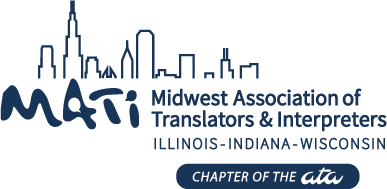by Enric Mallorquí-Ruscalleda, Indiana University-Purdue University Indianapolis, Board Director, Midwest Association of Translators and Interpreters
This fall, 28 of my students in the undergraduate translation studies course I teach at Indiana University-Purdue University Indianapolis (IUPUI) attended the annual MATI conference. The idea to have students participate was something we had discussed with IUPUI Professor Emeritus Dr. Enrica Ardemagni. Dr. Ardemagni was a founder of MATI, and also helped establish the undergraduate translation certificate program at IUPUI. She deserves much of the credit for the healthy status of the translation profession in the Midwest, and for creating a bridge between the academy and the professional world of translation and interpreting.
Among the activities that we thought about with Dr. Ardemagni was student participation in the annual MATI conference. This was recently carried out with a total of 28 IUPUI’s undergraduate students, all of them students of Spanish 323: Introduction to Translating Spanish & English, which I have been teaching regularly at IUPUI for almost three years now.
In addition to the transfer of knowledge that I intend to provide students with in class, both on a theoretical and practical level, with this activity I also sought to train the students with the goal for them to achieve a higher translation competence and to make them aware of the importance of life-long learning and education in the field of translation studies; I also intended to use this practice, although not limited to the students' exposure, to further the following:
- To offer them possibilities to hear about other perspectives and other practitioners, problems, solutions, and concerns among professional translators: daily challenges, management of a translation project, etc., which cannot always be best illustrated in class due to the amount of topics we cover in an introductory class and with only 15 weeks to do so.
- Of particular interest has been to relate the above mentioned with the characteristics and specificities that the work of the translator/interpreter has acquired in this era of the Covid-19 pandemic.
- To allow students to establish an always necessary professional networking.
- To help students build up their respective resumés with meaningful professional activities even during their tenure as undergraduate students.
- To make them aware of the importance of life-long learning and education in the field of translation studies.
More specifically, the task I asked them to complete with this participation at MATI’s annual conference was to attend at least one full session and write a critical report in which, after summarizing the content of the session, they would close it with a critical commentary on both what they had studied in class (the book used for the first part of the course, when they attended the conference, is Jeremy Munday's well-known book, Introducing Translation Studies: Theories and Applications).
Because my students are, after all, the real protagonists of the exercise, together with the speakers of the different sessions; it’s been interesting to read their opinions about what they have learned in the different sessions.
One student wrote: “Overall, I think that this conference was extremely helpful and insightful about what it is like to be a translator and what you can do to assure that you are being valued and appreciated in the workplace…I learned that you must always have the proper equipment for translating, create a contract for yourself, and never let anyone devalue your work. I am very grateful for the opportunity to attend this conference and look forward to using the information that I have learned in the future.”
My students’ comments on their respective experiences, considering it was the first time for them taking a translation class, and that the MATI conference was held during the first month of this particular class, could not be more positive, based on the enthusiastic feedback received from them. Without any doubt this will be an activity that I will keep implementing in my translation classes; I have been doing this for years in my literary classes, but this was the first time in a translation class.
The fact that I had the pleasure, honor, and privilege to be able to be part of the organizing committee of the conference this year with a group of outstanding translators/interpreters and even better human beings, helped me a lot to be able to open this opportunity to students. However, I would like to take this opportunity to thank MATI, and more particularly all the executive committee, with Christina Green as President, along with all of the rest of the MATI’s Executive Board. I am also grateful to my home department, World Languages and Cultures, my institution, IUPUI (through my research fund), and the Nuthiling Language School for having facilitated the economic resources to help my students participate by entirely covering the registration fees in this educational and transformational activity for them.
